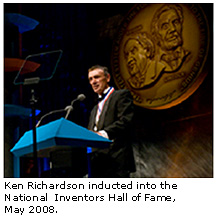
“Raiders of the Lost Arc” took in millions at the box office, Ronald Reagan took office for his first presidency, Sandra Day O’Connor took her seat as the first woman ever on the Supreme Court bench, and AIDS (which was first identified) took the world by storm.
It was 1981 and history was being made around the world, including at Pfizer’s Sandwich, England labs where Pfizer retiree, Ken Richardson, and his research team were inventing a compound that would later have a dramatic impact on the world -- the anti-fungal fluconazole or Diflucan.
Ken made history again in May of this year when he was inducted into the National Inventors Hall of Fame (NIHF) in recognition of his inventing Diflucan, which has been credited with saving millions of lives since its approval in the late 1980s. Criteria for entry into the NIHF is strict, granted only to those inventions/inventors that have “contributed to the welfare of mankind and have promoted the progress of science.”
 Ken is one of only two Pfizer researchers who have been inducted into the NIHF – the other, not surprisingly, is Lloyd Conover, who was inducted in recognition of his work in inventing tetracycline and who not only hired Ken into Pfizer in 1969 at the Groton, CT R&D facility, but mentored him for years. Ken relocated to Sandwich, England, at the end of 1973, which is where he worked on Diflucan.
Ken is one of only two Pfizer researchers who have been inducted into the NIHF – the other, not surprisingly, is Lloyd Conover, who was inducted in recognition of his work in inventing tetracycline and who not only hired Ken into Pfizer in 1969 at the Groton, CT R&D facility, but mentored him for years. Ken relocated to Sandwich, England, at the end of 1973, which is where he worked on Diflucan.
“Millions of people have received this drug,” says Ken, who retired from Pfizer in December 1997. “To say I’m proud is an understatement.”
Ken had worked on many projects including penicillins, antivirals, animal growth promotants and antibacterials, but none of these resulted in a chemical good enough to be a marketable drug. He noted, “I always believed that if I worked hard and was as creative as possible, one day I would discover a breakthrough drug that would be important for mankind.” Fortunately he was right.
Ken stressed it’s important to recognize that every patient is a daughter or mother, son or father, brother, sister or close friend. So he understood early on that his work would have a direct effect on entire families. “And believe me,” he said, “that’s a wonderful feeling.”
It’s no surprise to most of us that it takes many people with a wide range of different skills and knowledge to bring a medicine to market. While his name might be on fluconazole’s patent, Ken doesn’t feel that it’s his invention alone. “I didn’t discover a drug on my own; you need a real team around you to discover a drug,” he says. “I worked with top biologists, pharmacokineticists and many, many more talented people.”
When Ken first interviewed with Pfizer, it wasn’t just the prospect of working to help find medicines that could help people feel better or take away pain that intrigued him; he also really liked the people he might be working with.
Now that Ken is retired, he and his wife, Marie, are keeping busy. They have hiked all over England, often doing the national trails like the 190-mile Coast-to-Coast across northern England, and the 210-mile Offa's Dyke which runs down the England-Wales border.
“We have also formed a small local walking group with other Pfizer retirees, and we walk once a month with them, taking it in turn to choose where to walk,” said Ken. “Our walking is not restricted to the UK, and we have also walked in Italy, Spain, and Greece.”
Ken also took up golf when he retired and helps his wife in the garden. They still live a few miles from the Pfizer site in Sandwich and stay in touch with former colleagues and keep up to date on the company – which is pretty easy since both his daughter and son-in-law work at the Sandwich site. Ken also spends time online, researching his family tree, for example, and enjoys taking care of their grandchildren once a month to give their parents a break.
“Retirement is great,” remarked Ken. “It allows Marie and me to be really spontaneous -- we can change our plans depending on the weather, or on a whim.”
Click here to see Ken Richardson's photo gallery.